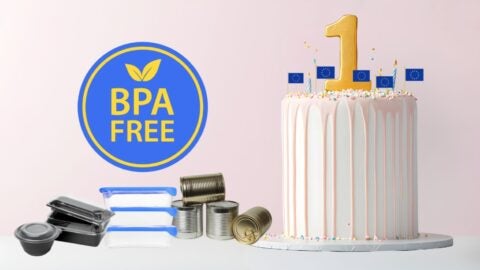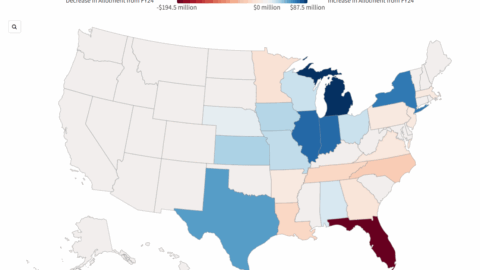
Why are four notorious carcinogens approved by FDA for food?
By Liora Fiksel, Project Manager, Healthy Communities, and Lisa Lefferts, Environmental Health Consultant
While exposure data are scant, people who are choosing decaf coffee during pregnancy or for other health reasons may not realize that some popular brands contain methylene chloride.
What’s Happening?
On December 21, 2023, FDA filed a food-additive petition and a color-additive petition submitted by EDF and partners that asks FDA to revoke its approval for four carcinogenic chemicals approved for use in food.
There is broad agreement that benzene, trichloroethylene (TCE), methylene chloride, and ethylene dichloride are carcinogenic,1 and federal law2 is clear: additives that cause cancer in humans or animals are not considered “safe.” All the chemicals have been identified as causing cancer in humans or animals since the 1970s and 1980s.3
Why It Matters
The petition addresses the following chemicals: (Please note that all links in this list are to PDFs.)
- Benzene: known to cause cancer in humans since 1980, is allowed in hops extracts (used in beer production and supplements). Benzene causes leukemia in humans and is also associated with other cancers in humans, including lymphomas and other blood cancers.
- Trichloroethylene (TCE): known to be carcinogenic to humans is allowed in decaffeinated coffee, certain extracts of spices used as food and/or color additives, and hops extracts. TCE causes kidney cancer, non-Hodgkin lymphoma, and liver cancer in humans.
- Methylene chloride: “likely to be carcinogenic to humans,” is allowed in decaffeinated coffee, certain extracts of spices used as food and/or color additives, ink used to mark produce, and hops extracts. Methylene chloride is also considered “reasonably anticipated to be a human carcinogen.”
- Ethylene dichloride: a “probable human carcinogen,” allowed in certain extracts of spices used as food and/or color additives, hops extracts, in water used to wash sugar beets, and to dilute pesticides. It is also considered “reasonably anticipated to be a human carcinogen.”
In fact, FDA has acknowledged that these chemicals cause cancer and other health harms. Based on the cancer evidence, FDA proposed to prohibit trichloroethylene in food in 1977, and in 1989 declared cosmetics to be adulterated if they contained methylene chloride as an ingredient.
The agency also alerts drug manufacturers that “benzene is a known human carcinogen that causes leukemia and other blood disorders” and advises them not to use benzene or ethylene dichloride to manufacture drugs “because of their unacceptable toxicity.”
In 2023, the EPA proposed banning all uses of trichloroethylene and most uses of methylene chloride regulated under the Toxic Substances Control Act, because of their known cancer risks and other health harms.
Our Take
Safer alternatives are available and allowing these notorious chemicals in food is unacceptable and unnecessary.
For example, safer alternatives–like water–can be used to decaffeinate coffee. Independent testing in 2020 [PDF, 332KB] and 2022 [PDF, 1.9MB] by the Clean Label Project revealed that coffee manufacturers may opt for methylene chloride to extract caffeine, leaving trace amounts of the carcinogen in some popular brands of decaffeinated coffee.
To safeguard the health of consumers, workers and communities, companies should prioritize adopting safer alternatives. Clearly, the transition is not only feasible but necessary.
Considering the evidence, FDA’s decision on this petition should be easy. There is a clear requirement in the law barring cancer-causing additives in food, and a scientific consensus that these chemicals cause cancer. FDA most recently exercised its authority on cancer-causing additives in 2018 when it granted another of our petitions to remove approval of certain carcinogenic flavors. FDA should quickly act to do the same in this case to follow the law, protect public health, and ensure the use of safer alternatives in the food industry.
Next Steps
Comments on the petitions are due March 11, 2024, barring any extensions. You can comment in support of both petitions:
Download a PDF copy of this blog [250KB]
NOTES
1 The carcinogenicity of all four chemicals is recognized by the Agency for Toxic Substances and Disease Registry, American Cancer Society, California, Department of Health and Human Services/NTP, EPA, and the World Health Organization’s International Agency for Research on Cancer.
2 Known as the Delaney Clause. See 21 U.S.C. § 348(c)(3)(A) for food additives and 21 U.S.C. § 379e(b)(5)(B) for color additives.
3 TCE in 1976, ethylene dichloride in 1978, benzene since at least 1980, methylene chloride in 1986.













9 Comments
Substances which are known to be carcinogens should never be allowed to be included in food, period. I am a coffee drinker and never knew that carcinogenic chemicals are used in the decaffeinating process! I won’t use decaf any longer. I also try limit my use of highly processed foods for health reasons. We need to know what is in our foods and be able to rely on our foods safety. This should begin with keeping dangerous chemicals out of our food. Our health depends on it.
When intelligent people know for a fact that these substances are dangerous, it would only make common sense to discontinuetheir usage immediately!
The FDA does NOT care about us. They allow corporations to add/use harmful chemicals to be keeps us sick which is what they want, and in turn it’s what keeps us going to the doctors. The medical industry, and those who run the world makes BILLIONS off of us being sick. Why would they want to change things. That, would interfere with their cash cow.
Only systemic change can fix the greedy power hungry government that is the United States. The banning of these cancer causing chemicals is definitely a good thing, but you’re so right that all of this is intentional!
In the US politicians make decisions based on payments they receive from special interests, many of which are pharmaceutical companies. The more people are sick, the better the profits. In other countries where the government pays for healthcare these chemicals are banned from the food supply. A government that pays your healthcare wants you healthy. A government that supports big pharma and the insurance companies rather than people wants you sick.
It’s not the fda, not the government. They don’t require to add these poisons into food productions. It’s the food manufactures voluntarily add these poisonous addititives. Setting rules and regulations is making these greedy dudes smarter to find other immoral ways to make money. It’s forever more rules and regulations hope to control the greedy smart guys. The simple rule to get along and get away the traps is to eat what God create, not what human create.
I intend to research everything I want to consume.
Tell me the F.D.A wants us healthy…on the contrary, sick people, big pharma make lots and lots of money on us.
Are These Ingredients Labeled ? FDA Should Mandate A Warning Label